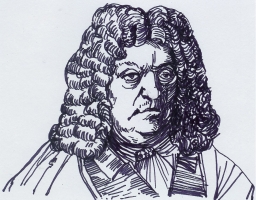Wacław Potocki facts for kids
Quick facts for kids
Wacław Potocki
|
|
|---|---|

Potocki Waclaw
|
|
| Coat of arms | Szreniawa |
| Born | 1621 Wola Łużańska |
| Died | 9 August 1696 (aged 74–75) Łużna |
| Noble family | Potocki |
Wacław Potocki (Polish pronunciation: [ˈvat͡swaf pɔˈtɔt͡skʲi]; 1621–1696) was an important Polish nobleman (a person from a noble family). He was also a moralist, which means he thought a lot about what is right and wrong. Potocki was a famous poet and writer.
From 1678 to 1685, he held a special position as the podczaszy of Kraków. He is known as one of the most important Polish artists from the baroque period. His most famous works are a long poem called Transakcja wojny chocimskiej (also known as The Chocim War). He also wrote a collection of short, clever poems called Ogród fraszek (Garden of Rhymes). These writings help us understand what life was like for the Polish noble families (called szlachta) during that time. They also show us the political and religious problems they faced.
Contents
Biography
Wacław Potocki was born into a family of less important noble people. His family belonged to a Christian group called the Polish Brethren. It is thought that he went to a special school run by the Polish Brethren in Racibórz.
After a big war called The Deluge (when Sweden invaded Poland from 1655 to 1657), the Polish Brethren were told they had to leave Poland. This was because some of them had helped the Swedish invaders. Wacław had to choose between leaving the country or changing his religion to Roman Catholicism. He chose to become Catholic, even though he didn't really want to. His wife, however, refused at first, and he worried about her for many years.
Potocki then worked on his family's land in Łużna, in the Podkarpacie region of Poland. He fought against the Cossack uprisings in 1638. He also took part in the Battle of Beresteczko in 1651 and in the wars against Sweden from 1656 to 1657.
Between 1665 and 1666, he supported a rebellion led by Jerzy Sebastian Lubomirski. Later, he supported kings Michał Korybut Wiśniowiecki and Jan III Sobieski.
Wacław Potocki believed that Poland's political system needed to change. He thought that the country would be more stable if kings inherited their power instead of being chosen by election.
When the Polish Brethren were forced to leave Poland, he supported them. Some Catholic noble people criticized him for this.
Sadly, Wacław Potocki lived longer than his wife and all his children. Two of his sons died during wars. His daughter, who people said was as talented at writing as he was, died when she was young. He lived with his family until he passed away in 1696. He was buried in Biecz.
Works
Wacław Potocki started writing around 1646. He mostly wrote for fun and didn't plan to publish his works at first. But his relative, Samuel Przypkowski, convinced him to share his writings. He wrote many classic poems and stories about the lives of noble people. During his lifetime, only two short works and a book called Poczet herbów (Herbary) were published.
His most famous work is Transakcja wojny chocimskiej (The Progress of the War of Chocim). He wrote this long poem between 1669 and 1672, but it was first printed much later, in 1850. It is his longest work and is considered one of the best epic poems written in Poland. It tells the story of the Battle of Chocim in 1621. The poem is historically accurate, but it makes the Polish heroes seem even better than they were. It is based on the diaries of Jakub Sobieski.
His short, clever poems, called epigrams, were written between 1670 and 1695. They were first published in 1907.
He also translated a book called Argenis by John Barclay. His translation was published in 1697.
See also
- Jan Chryzostom Pasek
- Argenis
Images for kids


